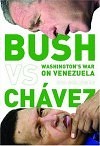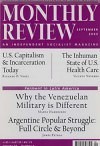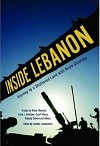Imperialism

President Hugo Chávez openly defies the ruling class in the United States, daring to push forward new productive relationships, to advance social reform that provides access to health care and education, to remove Venezuela from the economic orbit dominated by the United States, to diversify its production to meet human needs and promote human development, and to forge an economic coalition between Latin American countries. But as Bush Versus Chávez reveals, Venezuela’s revolutionary process has drawn more than simply the ire of Washington. | more…
On NBC Television News, last Friday night, pictures were shown of American refugees who had fled from Panama following the rioting there. One woman, relating the frightening experience of her husband, said: “His car was overturned, rocks were thrown at him, and he barely made it into the Canal Zone.” | more…

It took only a few months following the official ending of the Iraq War for U.S. imperial designs to unravel almost completely. The Bush administration is now under fire from the intelligence community, the media, and the political elites for having lied its way into the war with its claims regarding Iraqi weapons of mass destruction. More damaging still to administration plans, occupying troops and their Iraqi collaborators are being killed on an almost daily basis in what is now taking on the appearance of a classic guerrilla war. This would be impossible without the support offered to the insurgents by substantial sections of the Iraqi population. Consequently, the United States is being compelled to maintain larger numbers of forces than anticipated in Iraq (often by extending the duration in which military units remain in the country) and the projected term of U.S. military occupation is being drawn out | more…
The articles on imperialism in this special issue were all written in honor of Harry Magdoff’s ninetieth birthday. Most of them grew out of papers presented at the “Imperialism Today” conference organized to celebrate Harry’s life and work, held in Burlington, Vermont on May 3, 2003. The conference was from our perspective an enormous success. Penetrating analyses of the current imperial moment were presented, challenging questions came from the floor, and there were good discussions and good cheer all around—despite the grim turn of world events that needed to be confronted. In the reception at the end of the day U.S. Representative Bernie Sanders (Independent-Vermont), spoke of Harry’s achievement. As the conference participants gathered around he declared that | more…
Imperialism is meant to serve the needs of a ruling class much more than a nation. It has nothing to do with democracy. Perhaps for that reason it has often been characterized as a parasitic phenomenon-even by critics as astute as John Hobson in his 1902 classic, Imperialism: A Study. And (rom there it is unfortunately all too easy to slide into the crude notion that imperialist expansion is simply a product of powerful groups of individuals who have hijacked a nation’s foreign policy to serve their own narrow ends. | more…
I am going to start with two things with which I think nearly all MR readers will probably agree. One, imperialism is an integral part of the capitalist world-economy. It is not a special phenomenon. It has always been there. It always will be there as long as we have a capitalist world-economy. Two, we are experiencing at the moment a particularly aggressive and egregious form of imperialism, which is now even ready to claim that it is being imperialist | more…
The war in Iraq has reconfigured the global geopolitical landscape in many ways, some of which may not be apparent for years or even decades to come. It has certainly altered the U.S. relationship with Europe and the Middle East. But its impact goes well beyond this. More than anything else, the war reveals that the new central pivot of world competition is the south-central area of Eurasia | more…
At the onset of the U.S. military invasion of Iraq, Senator Robert Byrd emotionally queried: “What is happening to this country? When did we become a nation which ignores and berates our friends? When did we decide to risk undermining international order by adopting a radical and doctrinaire approach to using our awesome military might? How can we abandon diplomacy when the turmoil in the world cries out for diplomacy?” | more…
The period between September 11, 2001 and the invasion of Iraq raised many questions about the psyche of the U.S. public in general and the U.S. working class in particular. The ability of the Bush Administration to utilize fear and patriotism to refocus attention away from pressing domestic issues has been astounding. The Republican Congressional victories in November 2002 were nearly unprecedented and most likely would not have happened had the focus on Iraq not emerged during the prior summer | more…
The creation and cultivation of fear is one of the pillars of empire both abroad and within the imperial “homeland.” And that fear is always accompanied by the threat of discipline, punishment, and violence. Every state uses violence to enforce its power against its enemies, but we must recognize that a major change has occurred. September 11, 2001 gave a green light for a full blown, and bipartisan, agenda of repression at home, as well as for the expanded imperial project abroad | more…

In May 2006, Noam and Carol Chomsky visited Lebanon for the first time—just two months before Israel unleashed a new military campaign against both Lebanon and Palestine. During their eight-day trip, they toured refugee camps and a former Israeli prison and torture compound; met with political leaders—including the pro-government coalition; and Noam conducted interviews and gave public lectures on U.S. imperialism and the imminent crises facing the Middle East. | more…

The dangers and immense suffering caused by all attempts at solving deep-seated social problems by militaristic interventions, on any scale, are obvious enough. If, however, we look more closely at the historical trend of militaristic adventures, it becomes frighteningly clear that they show an ever greater intensification and an ever-increasing scale, from local confrontations to two horrendous world wars in the twentieth century, and to the potential annihilation of humankind when we reach our own time. | more…



